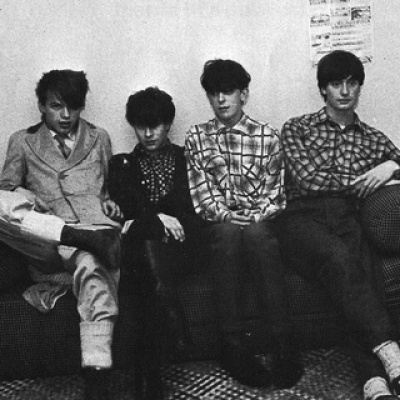
Orange Juice
by Jason Ankeny The leaders of the Scottish neo-pop uprising, Orange Juice formed in Glasgow in late 1976. Originally dubbed the Nu-Sonics, the group comprised vocalist/guitarist Edwyn Collins, guitarist James Kirk, bassist David McClymont and drummer Steven Daly; following the formation of the Postcard label by Collins protege Alan Horne, the quartet renamed itself Orange Juice in 1979, adopting the new moniker as well as an aura of romantic innocence as a direct reaction to the increasingly macho aggression of punk. As Postcards flagship band, Orange Juice quickly distinguished the label as a leading proponent of independent pop music; their 1980 debut single Falling and Laughing, recorded for less than 100 pounds, garnered massive critical acclaim, and subsequent releases like Blueboy, Simply Thrilled Honey and Poor Old Soul further established the group as a major new talent. Soon, sessions began for a full-length album; however, in the midst of recording, Orange Juice left Postcard to sign to Polydor, which funded the LPs completion. After the 1982 release of the album, titled You Cant Hide Your Love Forever, ex-Josef K guitarist Malcolm Ross joined the group, hastening the exit of Kirk and Daly (who went on to form Memphis) and paving the way for Zimbabwe-born drummer Zeke Manyika. Manyikas addition gave Collins the new capability of exploring a more complex fusion of pop and blue-eyed soul; consequently, 1982s Rip It Up was a more ambitious affair than its predecessor, veering from the buoyant Motown tribute I Cant Help Myself to the energetic pop of the title track, Orange Juices lone Top Ten single. However, subsequent releases failed to chart, and relations between the group and Polydor began to disintegrate; amid these tensions, both Ross and McClymont quit, with Ross later resurfacing in Aztec Camera. Reduced to the duo of Collins and Manyika, Orange Juice enlisted reggae producer Dennis Bovell to record the 1984 EP Texas Fever. After a makeshift tour, Collins and Manyika returned to the studio to record a dark, ambitious full-length effort; released in 1984, neither The Orange Juice nor its singles What Presence?! and Lean Period charted, and Collins was dropped from his contract, although Polydor kept Manyika on as a solo act. Only in 1995 did the stunning single A Girl Like You finally win Collins the commercial respect that had so long eluded him and his former bandmates. Later on, throughout the late 90s and early 2000s, the rise of Scottish bands as disparate as Belle & Sebastian and Franz Ferdinand won Orange Juice a younger set of fans, helped in great part by the 2005 compilation The Glasgow School.
